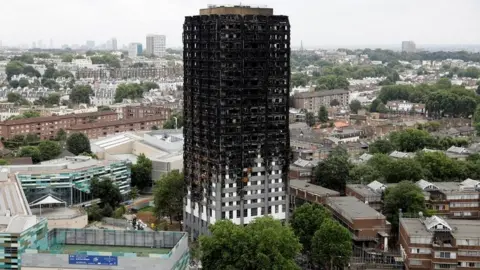Grenfell Tower: Council spends £21m keeping survivors in hotels
 Reuters
ReutersNearly £21m has been spent keeping Grenfell Tower survivors in hotel rooms, enough to have built the original block an estimated three times over, new figures suggest.
More than nine months after the fire which killed 71, 62 families have moved into permanent homes and 82 are still in emergency accommodation.
The council says it is doing everything it can to re-house survivors.
It added it bought hundreds of new homes to offer "maximum choice".
The Royal Borough of Kensington and Chelsea (RBKC) said it has hired 300 extra people working "around the clock" to "re-house families as quickly as possible".
The council spent £20.9m on rooms at 53 hotels for residents of Grenfell Tower and evacuees from the neighbouring Lancaster West estate between 14 June 2017 and February 15 this year, figures obtained by the Press Association under the Freedom of Information Act show.
'Not suitable'
Kensington MP Emma Dent Coad said building the 24-storey block today would cost about £6.2m, less than a third of the council's hotel expenditure.
"I spend a great deal of time visiting displaced families in hotels and, without exception, they want permanent homes which suit their needs, but are not being offered anything suitable," she said.
"Their lives are not only on hold. For many, this has lost them jobs and businesses and destroyed their ability to work or study."
But deputy council leader Kim Taylor Smith, who is in charge of the authority's Grenfell recovery process, questioned whether Ms Dent Coad "would prefer us to not spend money on giving people a roof over their head?".
Yvette Williams, co-ordinator at Justice4Grenfell, said: "The figure of £20m is much less than would have been necessary to make Grenfell Tower safe in the first place. It's infuriating."
The council, Mr Smith said, used more than £235m of its reserves to buy 307 homes.
Dozens still in hotels
However, in data released to the BBC, the authority said that only 64 of those properties have been taken up by families, two of whom are only staying there temporarily.
The council also admitted that 82 families from Grenfell Tower and neighbouring Grenfell Walk, which was also badly damaged in the fire, are still "in emergency accommodation - mainly hotels".
So far, the council has made 804 housing offers to 205 Grenfell Tower families, but only 188 have been accepted.
'Different times'
The council said reasons for offers being rejected include "many flats and houses are not as big as the apartments were at Grenfell" as well as "issues such as many homes having open-plan kitchen and living areas".
Antonio Roncolato, 57, a restaurant manager, is among survivors living in temporary accommodation.
"I'm in a very nice big flat off Kensington High Street. After staying in a hotel for seven-and-a-half months, it is a welcome break," he said.
"I know it's not permanent and I'm looking forward to settling down, but I'm not in a rush because I know my next choice is going to be for life."
Asked why re-housing survivors is taking so long, the council spokesman said: "We are moving at the pace of survivors and we believe nobody should be forced to make a decision on what is a very big decision at a very traumatic time."
Mr Smith added: "We have clear housing policies in place to help people from the wider community move out of hotels into temporary accommodation or back to their homes.
"£30m has already been committed to a major refurbishment project on the Lancaster West estate. This is being led by local residents, of which the majority are living on the estate, who want to make their community a great place to live in the future."
